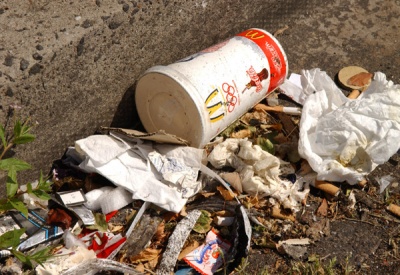Councils to receive tougher powers to combat litterers
Councils are to receive tougher powers to tackle littering which would see maximum on-the-spot fines almost doubling from £80 to £150, in addition to the power to punish drivers who throw litter from their vehicles, due to come in by April next year.
Cleaning up litter across the UK cost local councils nearly £800 million in 2015/16. Councils and other authorities have the power to issue on-the-spot fines for littering and other anti-social activities, with penalty levels set by the government. The minimum for littering is currently £50, set to rise to £65, while the default line will increase from £75 to £100.
Announcing the new powers, which are subject to Parliamentary approval, Resources Minister Therese Coffey said: “Littering blights our communities and spoils our countryside and taxpayers’ money is waste cleaning it up.
 “These new fines will make sure the perpetrators, not the local community, bear the cost of keeping our streets and roads clean.”
“These new fines will make sure the perpetrators, not the local community, bear the cost of keeping our streets and roads clean.”
For the first time local authorities will also be able to apply these penalties for littering to vehicle owners if it can be proved litter was thrown from their car - even if it was discarded by somebody else.
Defra will be producing guidance at the end of the year, the the government warning that councils must not abuse the power to impose fines. The department also says that councils should take into account local circumstances, like local ability to pay, when setting the level for these fines.
Responding to Defra’s announcement, Cllr Martin Tett, the Local Government Association’s Environment spokesman, said: “The LGA has long called for councils to have greater powers to tackle litter, which is a blight on the communities we serve, and these measures are a hugely positive step in the right direction.”
“Allowing councils to fine the owners of vehicles which litter is thrown from, rather than expecting councils to prove who exactly in the vehicle had thrown the litter, is also something the LGA has long called for. It is great that from April, councils will be able to get tough with the anti-social minority who think our roads are a repository for rubbish.
“We now need to see more detail in the forthcoming government guidance. Whilst recognising that any action must be proportionate, it must also be robust to deter abuse of the local environment. It is frequently the more deprived communities that suffer most from litter louting and where the demand for more enforcement is loudly heard. Local authorities are keen to get on with the job of tackling anti-social litter louts, and delivering local environments that our residents can be proud of.”
The changes to fines, to be introduced to Parliament by the end of 2017, follow a public consultation on littering which showed that the overwhelming majority (85 per cent) of people were in favour of increasing on-the-spot fines.








